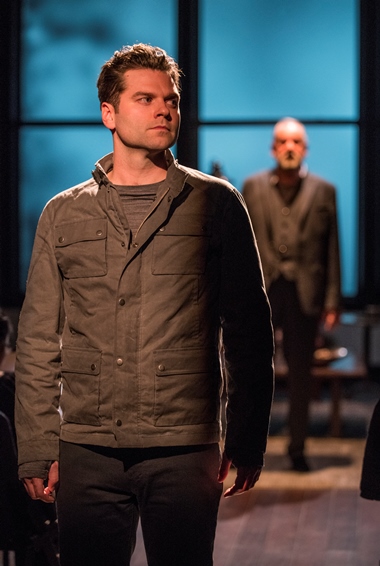‘A Number’ at Writers: Haunted by the past, dad seeks ideal son in future perfect of DNA

Bernard (Nate Burger), or a version of him, has some serious issues with his father (William Brown). (Production photos by Michael Brosilow)
Review; “A Number” by Caryl Churchill, directed by Robin Witt at Writers Theatre through June 9. ★★★★
By Lawrence B. Johnson
Salter’s little boy was perfect. Beautiful. In his father’s eyes, the child Bernard was everything a man could wish for. Then, something happened. What, exactly, is the conundrum at the core of Caryl Churchill’s intriguing futuristic play “A Number,” in which William Brown and Nate Burger now occupy the stage at Writers Theatre.
It is the near future, just far enough out that science has solved the puzzle of human cloning. And Salter has commissioned a replicant of his son, now grown to young manhood. That is to say, the fine looking lad standing before Salter at the play’s outset is a vital, youthful man. We’re about to discover, however, that nothing is quite what it appears to be, and what Bernard is saying – we catch him in mid-speech – has upset his father considerably. “A number,” the young man says: From the DNA material Salter provided, the doctors have created not one new Bernard, but several.
Salter (Brown, in a raw-edged performance that mixes high dudgeon with a blurred history) is confident that the figure before him is the right one – the “real” son, as it were. A father would know his own son. He is also outraged that multiple clones were created without his authorization. He might file a lawsuit.
As Bernard, Burger makes nuanced distinctions among several roles that all resemble the same person. This first version continues his troubling account of the way his father’s plan has gone off the tracks, and Salter only grows more agitated. Still, he assures the Bernard at hand that he’s the true son; after all, the boy seems to have memory of events that confirm his authenticity.
Brown’s distressed Salter steers the narrative. Around the time of the mother’s death, something also happened to the son, who was then about 4 years old. The child that had been so wonderful somehow changed. He became – disgusting. But now look, says the exuberant father. Look at you. You’re back.
Yet this embraceable Bernard is not the only one in sight. We’re about to meet another, not so much a replicant as a variant. This one is flinty, contentious, one might say as ominous as his dark attire. Unlike the tentative, deferential Bernard we first see, this version seems angry and he throws some history in his father’s face. (Switching off between these two versions of Bernard – and a third to come – must afford an irresistible challenge for an actor, and Burger has them individually honed to DNA precision.) This darker Bernard is not happy about the existence of other likenesses. He also conjures quite a different story about the fate of his mother.
With this defiant young man in his face, Brown’s elusive Salter is like a man on the psychoanalyst’s couch gaming some awfulness through a shifting conflation of truth, half-truth and fantasy.
The one person in the room who knows what really happened to his wife, indeed knows what shattered the portrait ideal of his son, is Salter. There’s a sense of something quite dreadful missing here that lends the play an aura of “The Twilight Zone.” One might even ask whether we’re looking inside the mind of one man, a permanently damaged – if not irretrievably guilty – soul whose summoning of his lost son is pure delusion. Somewhere in the past there has been a terrible break, perhaps an unspeakable act.
What nudges the tale back toward probable reality is that singular human characteristic greed. The longer Salter mulls the offense of the multiple clones, the more aggressively he raves on the fortune to be gained from a lawsuit. But there’s also another factor that pushes the story toward plausibility: bloody vengeance.
I mentioned a third clone, or anyway Burger’s third version of Bernard. This one is mild mannered with an open, curious, indulgent turn of mind. He appears on the scene out of, let’s say, necessity.
Related Link:
- Performance location, dates and times: Details at TheatreInChicago.com



